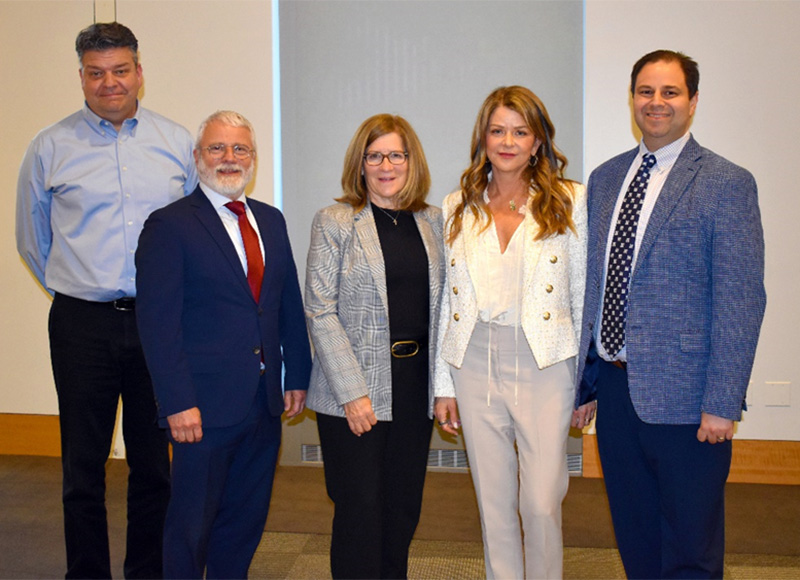Fordham REI hosts Gilmartin of MAG Partners and Reid of Aimbridge Hospitality

Allison Reid, former chief global growth officer, Aimbridge Hospitality; MaryAnne Gilmartin, founder and CEO of MAG Partners and
special adviser to REI’s executive advisory council; and Joshua Harris, executive director, REI.
Bronx, NY Real estate professionals and students gathered at Fordham Real Estate Institute’s (REI) Lincoln Center campus for a discussion on creating mixed-use developments comprising hospitality and entertainment venues to help transform downtowns. The conversation highlighted the importance of adaptability, stakeholder alignment and innovative solutions in creating urban environments to accommodate diverse needs and preferences.
“Live, Work, and Play: Developing Strong and Equitable Communities” was part of REI’s “She Builds” series, and featured MaryAnne Gilmartin, founder and CEO of MAG Partners and special adviser to REI’s executive advisory council and Allison Reid, former chief global growth officer of Aimbridge Hospitality. Joshua Harris, executive director of REI, was the moderator.
“I’m very honored to have two industry powerhouses, MaryAnne and Allison, join us today. Our ‘She Builds’ series showcases the innovative women who are transforming the real estate landscape, and also brings to the forefront the trends and issues shaping the industry,” said Anthony Davidson, dean of Fordham’s School of Professional and Continuing Studies.
Davidson also announced Fordham PCS has just received approvals from the New York State Education Department to offer a master’s degree program and related graduate certificates in hospitality this fall. The Hospitality Institute will be headed by Harris and offer aspiring students a pathway to roles in hospitality management, asset management, and entrepreneurship.
Harris kicked off the discussion with the role entertainment and hospitality enterprises play in urban and mixed-use developments.
“Hospitality and entertainment are playing a bigger role than ever in the built environment,” said Gilmartin. She cited a University of Toronto School of Cities study that found most cities have struggled to achieve 80% of the downtown activity they had pre-pandemic. “Yet cities like Charlotte, Houston, Jacksonville, are over 100% of where they were pre-pandemic, and a lot of it has to do with hospitality and entertainment,” Gilmartin said.
“Hotels are good for cities—they bring both inbound visitors and help the local community,” said Reid. She noted that when she lived in Los Angeles, “LA Live” was built featuring hotels, sports, music and cultural venues. “That solved a need because it got people from Los Angeles to go downtown, and then it allowed developers to locate housing downtown. LA Live is kind of a model – it met the housing needs and economic needs, creating jobs.”
Gilmartin cited another example of retail entertainment that transformed a neighborhood—Barclays Center in Brooklyn, which she helped develop: “It took 10 years of my life, 35 lawsuits and 638 public meetings to get the ability to build an arena as part of Pacific Park and bring hoops, jobs and housing to my hometown borough. It was a big deal, because there were people who just nostalgically wanted a sports team to come back to Brooklyn, people who wanted the jobs, and people who wanted the 2,432 units of affordable housing.”
The panel discussed other ways to recover downtowns and strengthen New York as a tourist destination, and cited high rents and work-from-home trends that are still keeping people away from New York City.
“For a city or a community to thrive, you need to figure out who is going to live there, who is going to work there and how they are going to play there,” said Reid. “Consider the model of work—whether remote or in the office or hybrid—people don’t just sit at a desk or in a cube. Things are evolving and we need to consider how things change over time.”
The Fordham Real Estate Institute (REI) hosted its “She Builds” series May 8, 2024, at Lincoln Center.
AmTrustRE completes $211m acquisition of 260 Madison Ave.


Lasting effects of eminent domain on commercial development - by Sebastian Jablonski

Behind the post: Why reels, stories, and shorts work for CRE (and how to use them) - by Kimberly Zar Bloorian

Strategic pause - by Shallini Mehra and Chirag Doshi









.jpg)

.gif)